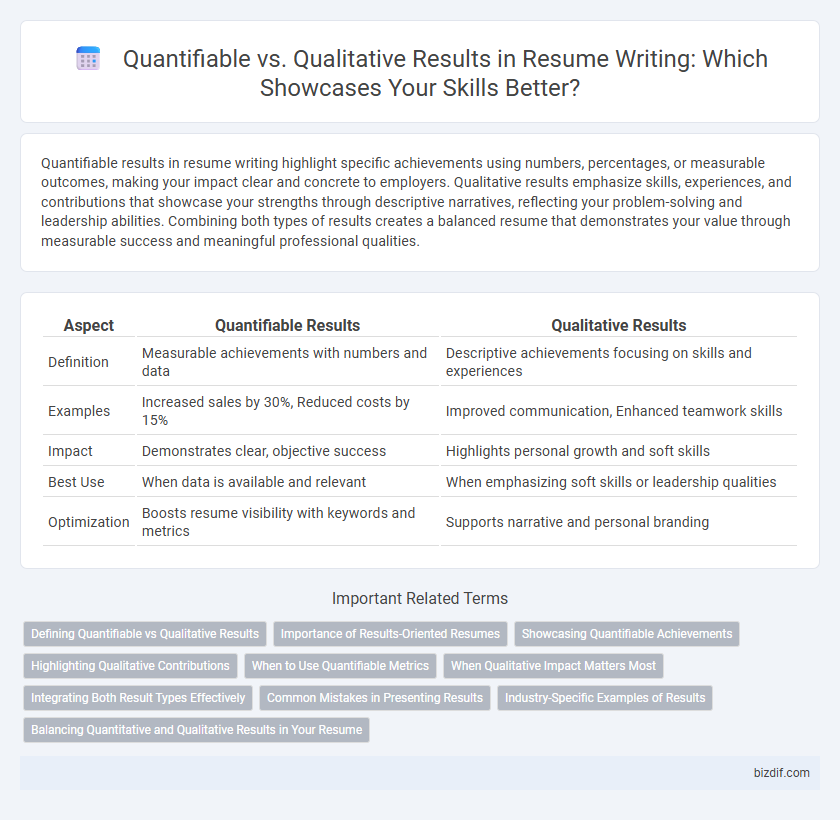Quantifiable results in resume writing highlight specific achievements using numbers, percentages, or measurable outcomes, making your impact clear and concrete to employers. Qualitative results emphasize skills, experiences, and contributions that showcase your strengths through descriptive narratives, reflecting your problem-solving and leadership abilities. Combining both types of results creates a balanced resume that demonstrates your value through measurable success and meaningful professional qualities.
Table of Comparison
| Aspect | Quantifiable Results | Qualitative Results |
|---|---|---|
| Definition | Measurable achievements with numbers and data | Descriptive achievements focusing on skills and experiences |
| Examples | Increased sales by 30%, Reduced costs by 15% | Improved communication, Enhanced teamwork skills |
| Impact | Demonstrates clear, objective success | Highlights personal growth and soft skills |
| Best Use | When data is available and relevant | When emphasizing soft skills or leadership qualities |
| Optimization | Boosts resume visibility with keywords and metrics | Supports narrative and personal branding |
Defining Quantifiable vs Qualitative Results
Quantifiable results in resume writing refer to measurable achievements expressed with numbers, percentages, or specific data points, such as "increased sales by 20%" or "reduced costs by $10,000." Qualitative results emphasize descriptive outcomes related to skills, experience, and impact, like "improved team collaboration" or "enhanced customer satisfaction." Defining quantifiable versus qualitative results helps employers evaluate both the tangible impacts and the soft skills candidates bring to a role.
Importance of Results-Oriented Resumes
Showcasing quantifiable results like percentage increases in sales or cost reductions provides concrete evidence of your achievements, making your resume more compelling to employers. Highlighting qualitative results such as leadership skills or problem-solving abilities complements these metrics by demonstrating your value beyond numbers. Emphasizing a results-oriented resume helps recruiters quickly assess your impact and separates you from candidates who only list responsibilities.
Showcasing Quantifiable Achievements
Showcasing quantifiable achievements in a resume highlights measurable impacts such as percentage increases in sales, project completion times, or cost savings, providing concrete evidence of performance. Employers prioritize these results because they clearly demonstrate an applicant's ability to deliver tangible value and meet business objectives. Quantifiable data enhances credibility and makes accomplishments stand out compared to generic qualitative descriptions.
Highlighting Qualitative Contributions
Highlighting qualitative contributions in resume writing emphasizes skills like leadership, creativity, and problem-solving that may not be easily measured but significantly impact team dynamics and project outcomes. Describing scenarios where you enhanced customer satisfaction, improved processes, or fostered collaboration demonstrates your value beyond numbers. These narratives complement quantifiable results, providing a well-rounded picture of your professional strengths.
When to Use Quantifiable Metrics
Quantifiable metrics should be used in resumes to highlight specific achievements, such as percentage increases in sales, the number of projects completed, or revenue growth, which provide concrete evidence of performance. Employers prioritize measurable results because they enable objective evaluation of a candidate's impact and productivity. Use quantifiable data when your accomplishments have clear, numerical indicators that demonstrate success and progress.
When Qualitative Impact Matters Most
Qualitative results matter most in roles that emphasize creativity, leadership, and interpersonal skills, where measurable metrics may not capture the full scope of impact. Demonstrating improvements in team morale, innovative problem-solving, or enhanced client relationships provides a compelling narrative beyond numbers. Hiring managers value these qualitative achievements when assessing candidates for positions requiring emotional intelligence and strategic vision.
Integrating Both Result Types Effectively
Integrating quantifiable results with qualitative achievements in resume writing enhances the impact by providing measurable evidence alongside contextual insights. Highlighting specific metrics like sales growth or project completion rates, combined with descriptions of leadership, creativity, or problem-solving skills, offers a comprehensive view of professional capabilities. Balancing numerical data with narrative explanations ensures recruiters understand both the scale of accomplishments and the quality of contributions.
Common Mistakes in Presenting Results
Common mistakes in presenting quantifiable results on resumes include using vague metrics without context and failing to highlight impact through specific numbers such as percentage increases or revenue growth. Qualitative results often suffer from being overly generic or too subjective, lacking concrete examples that demonstrate skills or achievements. Effective resumes combine precise data with clear explanations to create a compelling and measurable portrayal of accomplishments.
Industry-Specific Examples of Results
Highlighting quantifiable results, such as a 30% sales increase in retail or a 15% reduction in manufacturing downtime, demonstrates measurable success. Qualitative results like improved team collaboration in healthcare or enhanced customer satisfaction in hospitality emphasize valuable skill application. Industry-specific examples tailored to roles showcase both tangible outcomes and meaningful contributions, boosting resume impact.
Balancing Quantitative and Qualitative Results in Your Resume
Highlighting quantifiable results such as percentage increases in sales, cost savings, or project completion times demonstrates measurable impact on your resume. Complement these with qualitative achievements like leadership skills, problem-solving abilities, and positive team feedback to provide a well-rounded profile. Balancing both types of results strengthens your resume by showcasing your data-driven accomplishments alongside soft skills that drive business success.
Quantifiable results vs Qualitative results Infographic

 bizdif.com
bizdif.com